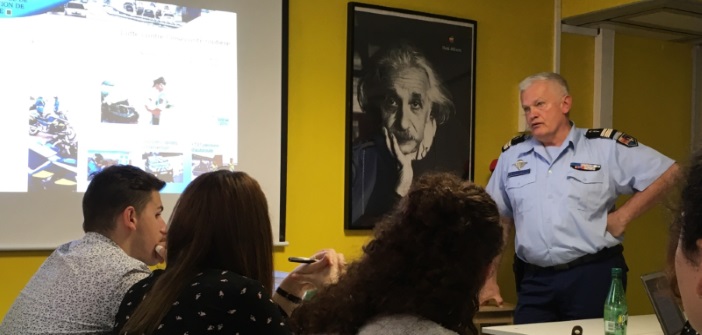Yesterday, Lieutenant Colonel Dominique Blasius met with journalism students. The agenda included a Q&A session on the topic of relations with the press.
The National Gendarmerie’s communications officer first introduced himself to the students, recounting his journey marked by numerous relocations (13 in total). After detailing the Gendarmerie and its various units, he engaged with a smile in a Q&A exercise related to the relations between the press and the Gendarmerie.
Overall, what are the relations with the press like?
Gendarmes are bound by professional secrecy and the confidentiality of investigations, but they still have the right to inform. Informing the press is not our primary concern, but everyone does their job and we don’t prevent journalists from attending events. Generally, every evening, a briefing is held with local journalists on the day’s happenings.
Have you ever had unpleasant surprises with the press?
It has happened before. We work on a relationship of trust. But if it happens once, we won’t let it happen a second time.
An example of misconduct or bad attitude towards gendarmes?
We have units that have encountered journalists who did not respect the established guidelines. Now these people are no longer allowed to come. They can put us in danger but most importantly, endanger themselves.
Is it complicated to get permission to go on a report with the Gendarmerie?
It’s relatively quick. It can be done from one day to the next. And with the new communications unit, it’s even faster. The Public Prosecutor, the Prefecture, and the Gendarmerie group commander must also give their approval. Of course, gendarmes are blurred and names are hidden. We sometimes refuse requests for reports, or our superiors might reject them even after we’ve approved. That’s just how it is.
In urgent situations, are these reporting authorizations always necessary?
No. I was on site during the Paris attacks at the Bataclan, for example. In emergencies, you need to be close enough to see what’s happening but not too close, so as not to interfere. The ideal is not to contaminate the scene.
Are there times when it’s more complicated to speak to the Gendarmerie?
Yes, and we are currently in one such period. It’s a presidential reserve period. We know, for instance, that we are not allowed to appear alongside an elected official in the press. It could be used against us or that official. But we still continue to communicate.
Three tips for young journalists arriving at a crime scene?
Have a good understanding of the environment and the area where you will be working. Identify the correspondent to establish a relationship of trust: the key is to know who to contact. We build our network little by little. Finally, be yourself and, above all, remain professional.


